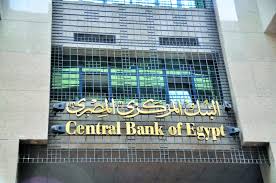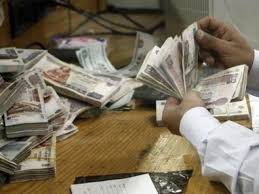
After a debatable meeting, the Central Bank of Egypt (CBE) decided to raise its benchmark interest rate to the highest level in at least a decade. The CBE decision aims to contain inflation and rise in prices that followed the Egyptian currency devaluation in March.
According to a statement issued by the CBE, the overnight deposit rate was raised by 1% point to 11.75%. Moreover, the overnight lending rate was raised by the same amount to 12.75 %. Economists were split before the meeting, with three predicting a hold and three forecasting an increase by as much as 50 basis points, according to Bloomberg survey.
The CBE has been striving to contain the economic crisis of the Egyptian currency fall relative to the dollar’s price as well as the shortage in foreign currency. In response, the CBE has taken various measures to curb the crisis; it devalued the Egyptian pound in March by more than 10 % and said it would adopt a more flexible exchange rate to ease a dollar shortage that led to the emergence of a black market for the U.S. currency.
However, since the downside of the devaluation was clear by May, the annual inflation has sharply risen to 12.23%. The inflation rate recorded the highest level since 2009. Moreover, the CBE policy remained handicapped to contain the black market trade. The Egyptian pound still traded at 10.96 per dollar, compared with the official rate of 8.88. The CBE has stated that its latest decision to raise interest rate aims to “warrant the anchor inflation expectations over the medium-term.”
It is believed that the pound’s devaluation was among the main factors that contribute to the dramatic rise in the inflation rate as well as the repricing of regulated goods, supply shocks and the rise in demand during the holy month of Ramadan. Jason Tuvey, London-based Middle East economist at Capital Economics said,“The latest inflation figures combined with the pressures on the pound have forced policy makers to take quite aggressive action.” He added, “The central bank will need to loosen its grip on the pound sooner rather than later. This hike possibly prepares the grounds for another round of devaluation.”
Economic experts believe that further government measures to boost revenue planned for later in the year may also raise prices. Among these measures, more cuts to electricity subsidies and the implementation of value-added taxation to meet the International Monetary Fund requirements to grant Egypt the demanded loan. Accordingly, interest rates are expected to rise more in Egypt during the coming period.
In this context, Cairo-based economist at the investment bank EFG-Hermes, Mohamed Abu Basha, predicts that such measures “indicate that there is room for further interest rate hikes later in the year.”
In addition, some economists had said the bank would be unwilling to raise borrowing costs because that would likely increase the government’s debt burden, hampering efforts to reduce the budget deficit to below 10% of economic output, reported Bloomberg news.
In fact, Egypt’s public debt stood at 98.4 % of gross domestic product in December, and the government expects interest expenses to make up about a third of its spending next year. The bank said,” Fiscal consolidation policies are necessary and will favorably contribute to macroeconomic stability and sustainable economic growth over the medium-term.”
According to Abu Basha, “The strict and aggressive nature of the CBE decision infers that the budget concerns will not deter the central bank from pursuing its main mandate of price stability.” He added that Inflation remains “high on the central bank’s agenda.”


